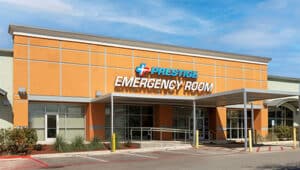Emergency Room for Stomach Pain Treatment
Abdominal pain can have a variety of causes. Some causes, like gas or indigestion, may be mild. Some, like appendicitis or kidney stones, are serious and require rapid assessment and treatment. Prestige Emergency Room is a top-ranked provider of abdominal pain treatment. Utilizing state-of-the-art technology and our onsite labs, our experienced providers can quickly diagnose and treat abdominal pain in patients of all ages.
It is vital to know when to visit an ER for stomach pain. Emergencies don’t wait, and neither should you.
When to Go to the ER for Stomach Pain
Severe abdominal pain requires prompt medical attention in the ER and may be accompanied by the following symptoms:
- Vomiting.
- Diarrhea.
- Fever.
- Bloody, dark, or sticky stools.
- Stabbing, sharp, or persistent pain that remains constant or comes in waves.
The location or timing of your pain can be significant:
- Severe abdominal pain in the lower left abdomen may indicate diverticulitis (an infection of the colon) or a kidney stone.
- Severe pain in the lower right abdomen may indicate appendicitis (inflammation of the appendix).
- Stomach pain that develops after an injury can be a sign of internal bleeding or another injury and should be evaluated in the ER immediately.
- Abdominal pain during pregnancy should be evaluated emergently.
Vomiting and diarrhea are common symptoms that accompany stomach pain. When should you visit an emergency room for these symptoms?
When to Go to the ER for Vomiting and Diarrhea
Nausea, vomiting, and diarrhea are commonly caused by viral gastroenteritis, sometimes called the stomach flu. Some cases of vomiting and diarrhea resolve on their own, but persistent or severe symptoms require emergency assessment and care. Sometimes, a more serious condition may be causing your symptoms. You should visit an ER for vomiting and diarrhea if:
- You are experiencing symptoms of dehydration, including extreme thirst, dry mouth, rapid heart rate, lethargy, weakness, decreased urination, dark-colored urine, fever, or dizziness on standing.
- Your vomit is bloody, dark, or resembles coffee grounds.
- You are experiencing a severe headache along with vomiting and diarrhea.
- Vomiting lasts more than 48 hours for an adult, more than 24 hours for a child under two, or more than 12 hours for an infant.
Food poisoning is another common cause of vomiting, diarrhea, and abdominal pain. It is important to know when to seek care in an emergency room.
When to Go to the ER for Food Poisoning
Food poisoning often results from eating food contaminated with bacteria, parasites, or other pathogens. Symptoms often include:
- Nausea.
- Vomiting.
- Diarrhea.
- Stomach pain or cramping.
- Headache.
- Fever.
- Weakness.
Food poisoning usually resolves within two days. Visit an ER for ongoing symptoms or the following:
- High fever (over 102°F).
- Bloody vomit or diarrhea.
- Dark or minimal urine.
- Confusion.
- Dizziness or weakness.
- Blurred vision.
It is vital to monitor children with vomiting or diarrhea for signs of dehydration, as they can become severely dehydrated more quickly than adults.
If you are experiencing severe abdominal pain or ongoing vomiting or diarrhea, visit our providers at Prestige ER.
What Can the ER Do for Stomach Pain?
At Prestige ER, our experienced providers will provide personalized treatment for your stomach pain. Diagnosis begins with a thorough review of your symptoms and a physical exam. Your provider will use palpation (gentle pressure) to determine the location of your pain. Depending on your risk factors and symptoms, your provider may order diagnostic tests, including:
- Blood work.
- Urinalysis.
- Ultrasound.
- CT scan.
Once your provider determines the underlying cause of your stomach pain, your treatment may include:
- Pain medication to reduce pain and inflammation.
- Antibiotics to fight infection.
- Medications to treat diarrhea or constipation.
- Medication to manage the production of stomach acid.
- IV fluid therapy to correct dehydration from vomiting or diarrhea.
If your provider identifies a serious underlying issue like appendicitis, diverticulitis, or a hernia, surgery may be required.
What Causes Abdominal Pain?
Abdominal pain can be caused by benign issues like indigestion or gas or more severe causes like appendicitis or kidney stones. Some common causes of abdominal pain include:
- Stomach virus (stomach “flu”).
- Diarrhea or constipation.
- Food allergies or sensitivities.
- Indigestion.
- Gastroesophageal reflux disease (GERD).
- Food poisoning.
- Ulcers.
- Irritable bowel syndrome (IBS).
- Gallbladder disease or gallstones.
- Hernia.
- Kidney or liver conditions.
- Urinary tract infection (UTI).
- Appendicitis.
- Diverticulitis.
Because stomach pain can be caused by so many underlying issues, a medical exam is very important for diagnosing stomach pain and ensuring the proper treatment is provided to prevent more serious complications.
Prestige ER offers prompt, individualized emergency treatment for severe abdominal pain and other medical emergencies. Visit us at any of our San Antonio locations today.












